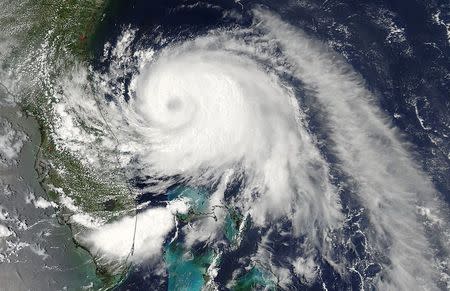Hurricane Arthur intensifies as it heads for North Carolina

By Gene Cherry RALEIGH N.C. (Reuters) - The first hurricane of the Atlantic season gained strength on Thursday with winds forecast to exceed 100 mph (160 km per hour) as it reaches North Carolina coast, where thousands of vacationers scrubbed their July Fourth holiday plans amid evacuation orders. Hurricane Arthur was about 110 miles (175 km) south-southwest of Cape Fear, North Carolina, with current maximum sustained winds of 90 miles per hour (145 km per hour), U.S. forecasters said. Moving faster at 10 mph (17 kph), the center of the storm was now expected to brush close to the North Carolina Outer Banks late Thursday and early Friday as a Category 2 hurricane with winds up to 105 mph (170 kph), according to the U.S. National Hurricane Center in Miami. The storm disrupted plans for holiday beachgoers and others ordered off low-lying barrier islands in the storm's path. Tourists and some residents packed ferries and crowded the only highway off Ocracoke and Hatteras islands, where voluntary and mandatory evacuations were in effect in anticipation of worsening weather conditions. "Pre-storm jitters and preparation," Dare County Commissioner Allen Burrus said of the mood early on Thursday. "Right now it is beautiful, but it is going to deteriorate around 5 or 6 this afternoon." Some locals said they would ride out the storm. Retiree Gerry Lebing, who owns a home in Waves on Hatteras Island, said he was tying things down at his house and moving cars to higher ground to avoid damage from the potential storm surge. The worst of Arthur's winds were expected to remain offshore, forecasters said. But the storm could bring gusty squalls, heavy rain, life-threatening rip currents and a storm surge of up to 4 feet (1.2 meters) to North Carolina's barrier islands. "There could be loss of electricity, there could be restaurants closing, there could be cars flooding and roads could be compromised," Hyde County manager Bill Rich said. Several towns and villages on North Carolina's coast rescheduled Independence Day festivities and fireworks as the storm approached. Farther up the coast, the resort town of Ocean City, Maryland, moved its July Fourth fireworks display to Saturday because of the storm. Boston officials also moved up to Thursday a nationally televised concert by the Boston Pops and a fireworks display, which draw hundreds of thousands of spectators to the city's riverfront. The hurricane center said Arthur will retain hurricane strength for at least 48 hours before weakening over cooler water as it spins to the northeast. (Reporting by Gene Cherry; Additional reporting by Anupam Chatterjee in Bangalore, Eric M. Johnson in Seattle and David Adams in Miami; Writing by Colleen Jenkins; Editing by Eric Beech and Susan Heavey)

